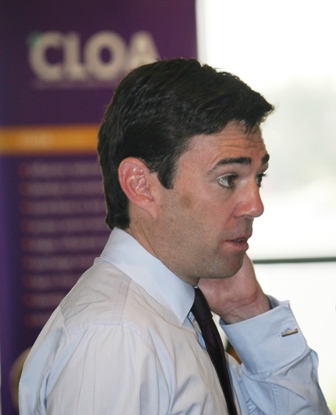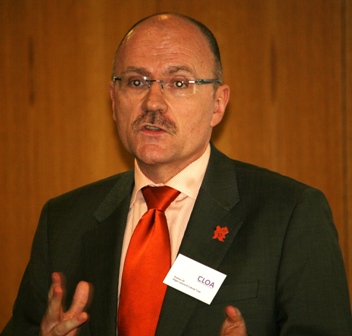
Andy Burnham: taking sport into health
Trust me, I’m your doctor’s boss
CLOA welcomed Andy Burnham to its recent meeting and found that the health secretary's former role as culture secretary seems to have left its mark. The Leisure Review reports from Wigan.

Andy Burnham: taking sport into health
When Dave Whelan built his local soccer team a stadium to play in he was not vain enough to put his name on it. He’s changed his mind now and attendees at the CLOA members’ meeting and AGM came together under the eaves of the DW Stadium to discover what else was new in Wigan, in CLOA and further afield. They were treated to a challenging and rewarding set of speakers and completed the day with the election of a new president and executive team.
The day before, the existing executive had met with guests to review the state of the sector and the challenges to be faced in coming months and years. Although the pending pressures on public expenditure loomed large in that debate, the mood had been positive, celebrating the progress made by CLOA and the National Culture Forum over recent years. Progress made in the relationship with the LGA was recognised, as was the first national leadership programme, which currently has 29 participants. The location of the meeting in the Leigh Sports Village and the new standards of delivery being set by Wigan Leisure and Culture Trust demonstrated the potential opportunities ahead when the sector is prepared to do new things and work in different ways. However, the meeting also recognised that our continuing inability to evidence the impact the sector can and does make to the economy, to outcomes for children and young people, and to the support of the most vulnerable sectors of the community remains a hindrance to further progress. To be a major force in the leadership of the sector CLOA must continue to attract new members, particularly from the major councils, and to promote the organisation as a major voice for the sector. The main event at ‘the DW’ presented four different but complementary examples of what the sector can do.
Simon Mellor, general director of the Manchester International Festival showed the power of arts and culture in positioning Manchester and the region on the world stage. An impressive array of statistics provided evidence of the impact the first festival had made in 2007 by taking risks to promote Manchester as a venue for new cultural work. The bean counters have calculated that the £7 million invested by public bodies and sponsors added to the £2 million taken at the box office generated an economic impact equivalent to £28.8 million in the North West and that the £2.5 million spent on marketing produced £12 million worth of coverage. Simon’s preview of the 2009 festival highlighted the council‘s role in underpining events from which sponsorship and wider investment have grown. He also emphasised the importance of political leadership for such events. While the council saw the money as an investment in the marketing of the city, Simon emphasised that, despite this commitment from the council, the event is seen by artists as independent of the council. He felt that artists would not have engaged in the same way had it been seen as a council event and while this may be a reality it is a disappointment for those trying to convince their own councils to invest, even on a much smaller scale. Of the many lessons that Simon drew out for the audience was the need for “friends in high places” and the need to attract “serious players in the sponsorship market” who would both “be attracted by association with original new work” and an eclectic mix of cutting edge artists.
Delayed by a call from Number 10, Andy Burnham, now in his new role as secretary of state for health, arrived breathless, jacketless and speechless. As part of a series of one-liners he explained his lack of prepared notes and then happily spoke for about five minutes before kicking off a dialogue that both surprised and delighted the 50-strong audience. While most present had been sorry to see him moved on so soon from the Department for Culture, Media and Sport (DCMS) after starting to make a difference to the national profile of the sector, he was quick to explain his desire to carry his messages about the power of sport and culture into his new role. The messages about preventative health and the value of physical activity is now starting to seep through the health sector and he was confident if we continued to advocate our case we could progress further. “The moment is coming for your world,” he reckoned, “The investment in health, wellbeing and happiness of the individual is an investment that culture and sport have a place in.”
He was clear, however, that we needed to better evidence the contribution we can make, perhaps by working with the National Institute for Health and Clinical Excellence (NICE) as a way of transferring good practice across primary care trusts. He wanted to go further, expressing a desire to see the sector make a similar argument and contribution to the debate about the future of social care in the country. He accepted that like physical activity, which “had been an orphan” before he “took it into the DCMS”, other parts of the culture and sport sector could contribute to improving the quality of life for vulnerable people. In response to a pertinent if rather lengthy question, he explained that he was particularly keen to see the sector address its contribution to supporting improvements in mental health. However, he made the point that future constraints on public expenditure will be a challenge for the preventive agenda in general and for sport, leisure and culture as a sector in particular. He also challenged the room and the sector to raise their game.
Asked about the future of central government prescription and targets, Burnham was equally clear that things will need to change. “I am clear in my mind that the era of top-down reform of public services is over,” he said. “My argument is that ‘targets’ should become ‘rights’.” He went on to argue that while the last decade of nationally driven public service reform had been successful at raising standards now is the time for councils to take up the challenge and drive improvement locally with leadership and innovation. Burnham was clear that culture and sport must be part of this change and that, having moved this agenda on, he did not expect the standards achieved to now fall back.
It was clear that many of the minister’s ideas are sourced in Wigan and anyone with a desire to see what modern public service delivery looks like would do well to spend some time in a town known more for pies and rugby league than innovation in public wellbeing. Burnham clearly has a positive working relationship with Rodney Hill, chief executive of the Wigan Leisure and Culture Trust, and certainly knows him well enough to use up much of Mr Hill’s allotted timeslot. However, so genuine was his response to the meeting’s questioning that no one begrudged him the overrun. Either he has achieved the politician’s nirvana and can fake sincerity or he is a nice bloke.
The local man curtailed his presentation but still managed to focus minds on what Wigan had achieved by doing things differently. Hill explained that the trust is now well positioned as part of the council’s agenda for improving Wigan and is grasping significant opportunities presented by strategic commissioning. This was demonstrated by the recent announcement of the appointment of a strategic commissioner for culture and sport in the council.
Since Beijing it has been well-nigh impossible to find a conference without a representative of British Cycling on the platform. “Success by the accretion of marginal gains” has been supplanted by “how we’ll spend Sky’s millions” as the preferred subject matter and Brian Cookson, the governing body’s president since a democratic coup twelve years ago, gave us valuable and exciting insight into their journey of improvement, starting with a governing body in meltdown, through multiple Olympic glory and thence to new challenges ahead with the Tour De France, 2012 and active cycling for all. It is a powerful story that many other governing bodies are now striving to emulate and what came over was the sheer professionalism, the desire to build an organisation fit for purpose and a commitment to continuous improvement at every level of the sport. If one thread ran through all four diverse presentations it was the value of the sector and the concept of excellence as a common goal.
A brief slot for valued and invaluable sponsors, Pulse, Alliance, SHOKK and Xn reminded those gathered that the sector includes a commercial side and that those in the public sector need to work with these colleagues to help improve the products and services we all provide. Finally to the CLOA AGM where it was time to say thank you to Dr Anne Gosse, the departing president who has done so much to both challenge the membership and raise the profile of CLOA across the sector, and to welcome Nigel Lynn to the role of president, along with the new executive. Nigel takes up the reins at what will be a challenging time for the sector but equally, as the event had shown, a time of great opportunity.
The Leisure Review, August 2009
© Copyright of all material on this site is retained by The Leisure Review or the individual contributors where stated. Contact The Leisure Review for details.
Download a pdf version of this article
Visit CLOA online at www.cloa.org.uk
